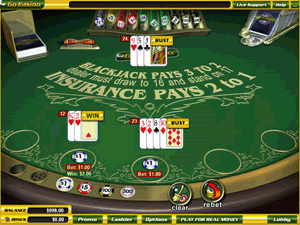 European rules blackjack is a variation of blackjack that is normally played with six decks. The game of European rules blackjack plays in a similar manner to regular blackjack in that each European rules blackjack player receives two cards and the dealer gets two cards (one up card and one down card). Unlike regular blackjack, however, the European rules blackjack dealer is not permitted to peak at his cards. Normally, the dealer peaks at his cards when they show an ace as the up card. However, in European rules blackjack, the dealers do not peak. Thus, the players are required to make decisions and play out their hands no matter what, and the possibility exists that their actions will be meaningless, as the dealer could be holding blackjack the whole time.
European rules blackjack is a variation of blackjack that is normally played with six decks. The game of European rules blackjack plays in a similar manner to regular blackjack in that each European rules blackjack player receives two cards and the dealer gets two cards (one up card and one down card). Unlike regular blackjack, however, the European rules blackjack dealer is not permitted to peak at his cards. Normally, the dealer peaks at his cards when they show an ace as the up card. However, in European rules blackjack, the dealers do not peak. Thus, the players are required to make decisions and play out their hands no matter what, and the possibility exists that their actions will be meaningless, as the dealer could be holding blackjack the whole time.
Another key difference in rules is that European rules blackjack players may not double down off the first two cards as they see fit. While the game of blackjack allows players to double down regardless of the card count they hold after receiving the first two cards, a European rules blackjack player is only permitted to double down on their bet if they hold a hard count of nine, ten, or eleven. This means that if a player was dealt eight, he may not double down even though it would be profitable to do so under many circumstances in a normal blackjack game. Players may double down after they have split a pair in European rules blackjack, again providing they hold a count of nine, ten, or eleven after the split.
When adjusting strategy to reflect the European rules blackjack rules of play, a player will double down in most instances that they are permitted to. When the player has a card count of nine, they will double down when the dealer shows a three, four, five, or six as the up card. When the player holds a count of ten, they will double down in all situations less the presence of a ten or ace as the dealer’s up card. The same stands true for instances when the player has a count of eleven. Additionally, the European rules blackjack player will play far more conservatively when the dealer holds a ten or ace. While one cannot count on the dealer having blackjack every time they have a ten or ace showing, the player must shy away from doubling down or splitting any hands where they may lose their entire bet from a dealer’s blackjack.



